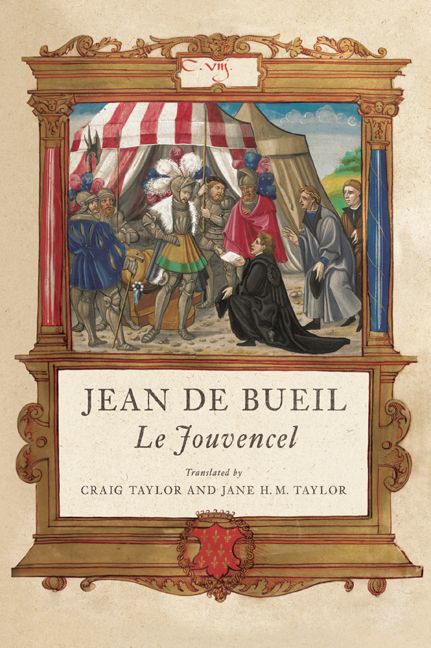Commentary by Guillaume Tringant
Published online by Cambridge University Press: 06 October 2020
Summary
[693] There follows here the commentary on Le Jouvencel, a text written in honour of God and the Virgin Mary, and of my lord St Michael the angel, to whom I pray that they afford me the time to complete my work in all truthfulness, as an example of how to conduct oneself in both war and in peace, and because the said Jouvencel is written in a strange and surprising mode and is intended to advise young men-at-arms to behave with wisdom, loyalty, and prudence. For provided that war is undertaken in good faith and for a good cause, in such circumstances I consider that it is just and pleasing to God to oppose tyrants and those who seek to seize the possessions of others merely to enhance their conceit and their prestige; it is for these reasons that I know that the book of Le Jouvencel is written to maintain right and to support a just cause, and that the matters that are recounted here are recorded only for that purpose, and never to endorse war engaged in support of tyranny, or for the sake of personal reputation, vainglory, or mere greed. And according to the reports of many good captains and companions who followed a career in arms and saw the majority of things recorded in the book called Le Jouvencel by Jean Tibergeau, lord of La Motte, Martin Morin, and Master Nicole Riolay, servants of my lord of Bueil, my master and theirs, and also according to the reports of valiant men who witnessed the war and spoke about what they had seen, these three men wrote the things recorded in Le Jouvencel to the best of their abilities and as truthfully as they could.
It is true, of course, that the love affair between Jouvencel and the daughter of King Amydas is a fiction; Jouvencel's adherents did not wish to portray Jouvencel as a tyrant or to have him become a great lord or a prince simply through tyranny, for [694] their book is a paean to justice and equity; marriage was the only way in which the young man could become a lord or a prince, for he was merely a poor young knight.
- Type
- Chapter
- Information
- Jean de Bueil: Le Jouvencel , pp. 249 - 270Publisher: Boydell & BrewerPrint publication year: 2020



